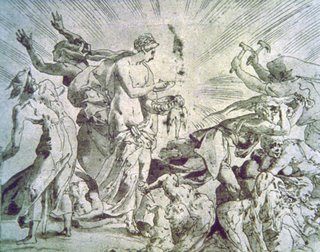Worst President Ever
No. This post is not about who you think it's about. I don't have any new or original gripe about the current resident of 1600 Pennsylvania Avenue. We'll have enough opportunities to pee on his leg-acy in future posts. And since there's always the remote possibility that, after a bout of stroke-inducing intern sex, he'll be secretly replaced by a comic impersonator who miraculously transforms his corrupt and moribund administration into FDR with more puppies and less polio, we should probably hold off on any final ranking of his presidency.
When the day comes, however, we should be prepared. So, who IS the worst president? Looking at C-Span's Survey of Presidential Leadership, the Historians' results, I was only mildly surprised to see that their bottom four were: 1) Buchanan, 2) A. Johnson, 3) Pierce, 4) Harding. Not a bad list. Importanly, Buchanan finished exactly where he should have as the worst president prior to the 21st century. JB wasn't just weak, ineffectual, or corrupt, he led the country into mistakes of world-historical importance. I am interested, however, at the commonalities of these bottom-feeders and how this list differs from others I saw a decade or more ago, when Harding, Hoover, Nixon, and Grant all figured among the "worst." The top three on C-Span's survey were all Democrats on the wrong side of history with respect to the race issue, either before or after the Civil War. So placing them at the bottom is minimally controversial, at least today. I suspect that the reason they're now on bottom is a coincidence of memory between today's Dems and Pubies: the Dems have been the party of racial progressivism since the 1960s, whereas the Pubies have gradually replaced race with abortion as the pivot of their culture war, embracing racial emancipation as template for fetal rights. Historians of both parties can then condemn the same men if for slightly different reasons.
What most surprised me about the list was the rehabilitation of Nixon, who has scaled from bottom three a few years ago to a respectable 25th best out of 41 now. On both his ranking and his raw score (477/1000), he's only slightly below average. Frankly, this is a bit daft. Although you can make a case for some of Nixon's policies, foreign (China) and domestic (approving the EPA), no president has ever done more damage to the institution of the presidency or behaved with such cynical lawlessness both at home and abroad. But again, I suspect that current politics shed light on the change: the GOP now wants above all else to vindicate the "imperial presidency," whereas Dems can look back on Nixon's policies as moderate in retrospect, at least when compared to GWB.
It shouldn't be a shock that contemporary politics can affect historians' evaluations of past presidents. But it also opens up another realm of prediction: what will happen to these evaluations as a result of the likely political shifts of the next several years? In other words, how will Bush's legacy affect theirs? My guess is that if, as I think likely, issues of GOP corruption and executive power eventually reach a critical mass, resulting in either a public fall by Bush or an ascendent McCain-reformism movement within the GOP, Nixon and Harding will again drop as they become emblematic of a stained present that both parties want to wash clean. I also expect Clinton to climb about ten spots from his current 21st as the shock of sex scandal fades and the 1990s come to be seen, for the nostalgics of both parties, as the new 1950s. Any thoughts?








